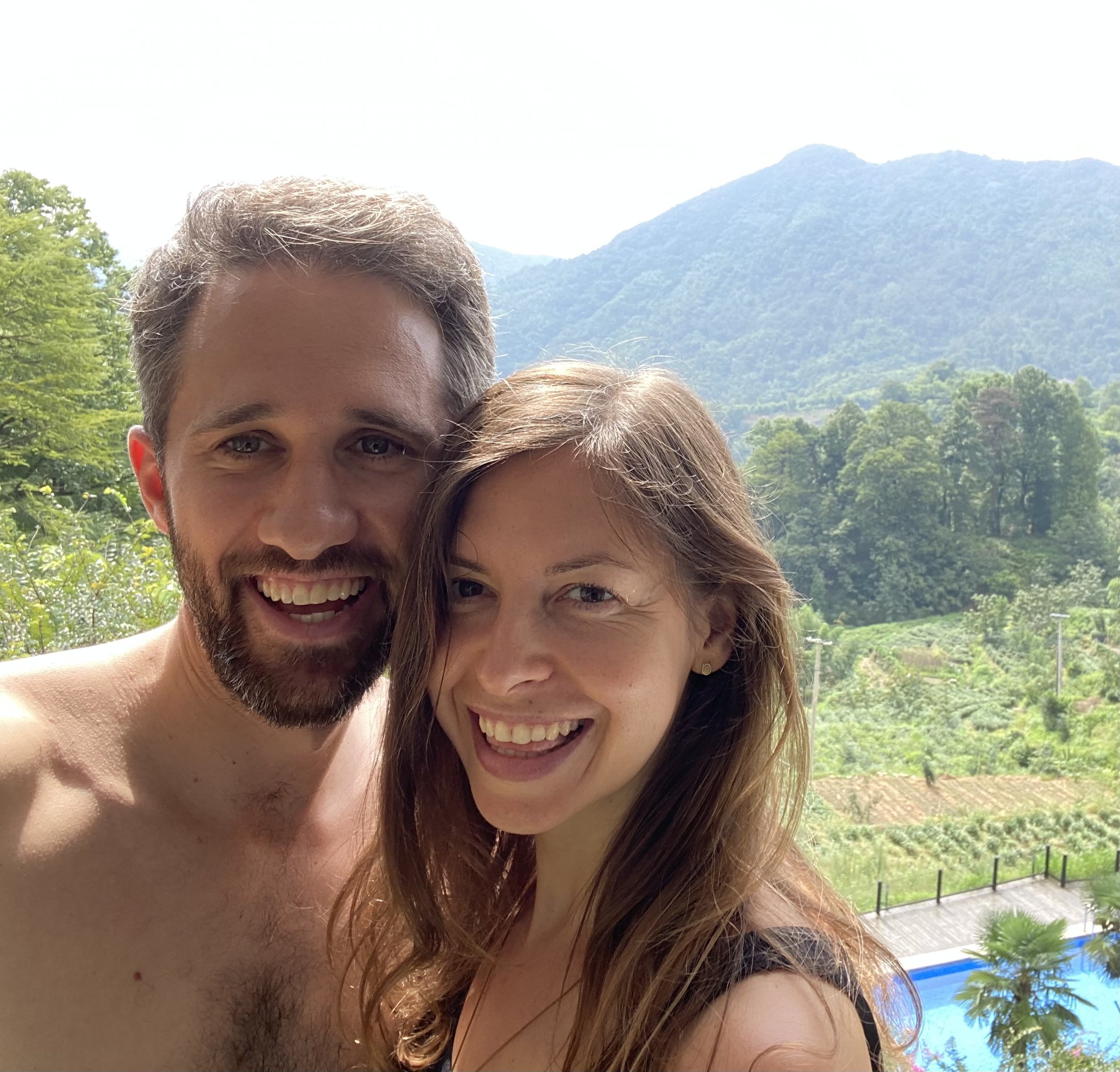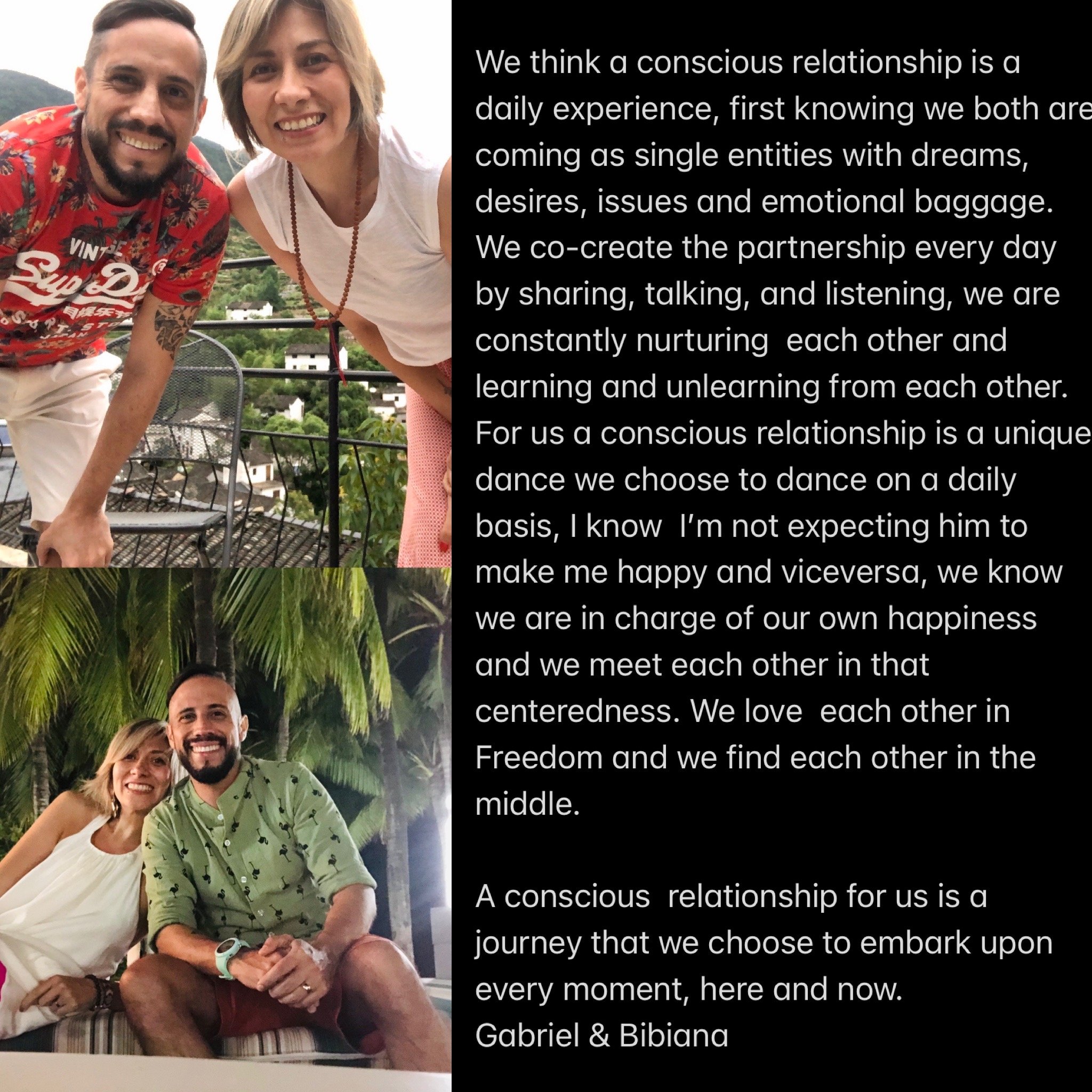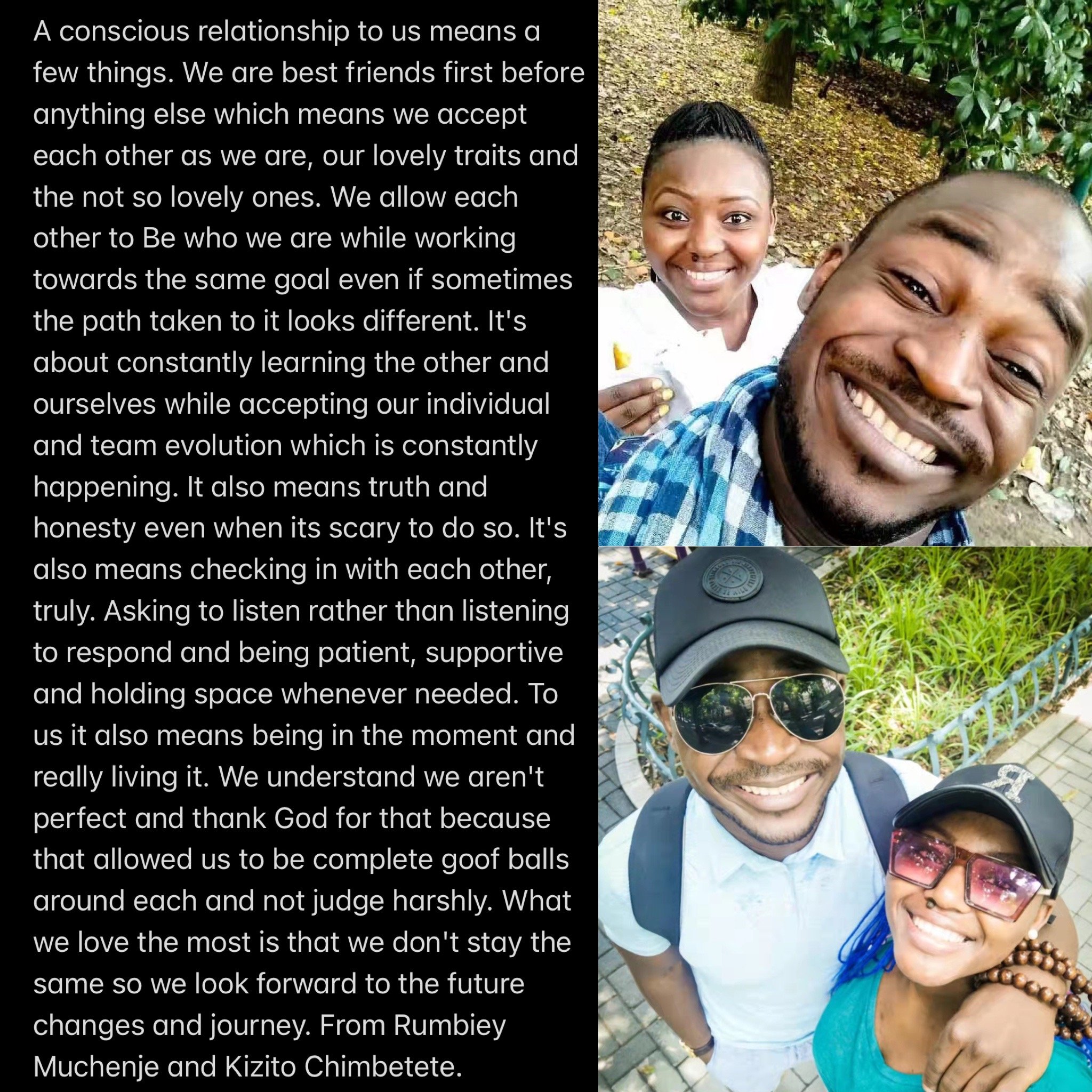A co-committed relationship may look like magic, but it really is composed of tiny moments of choice. Choosing to tell the truth. Noticing that you are projecting, and finding the courage to take responsibility. Choosing to feel rather than go numb. Choosing to communicate about a broken agreement. Choosing to support your partner as he or she goes through deep feeling. Ultimately, once these skills are practiced and internalized, the relationship flows effortlessly. Once your nervous system learns to stay at a high level of aliveness and does not need to numb itself by lying, breaking agreements, and hiding feelings, the creativity starts to flow.
- Gay Hendricks
Awww I just love this quote… Often I hear people say they want a healthy relationship in which they can feel supported and loved, but only a few of us are willing to put in the work to create it. For most of us, our idea of what makes a romantic partnership was formed by watching our parents... which, for a lot of people, might not be ideal. As children we are like sponges soaking up every word and action from our parents, and based on that knowledge, we form beliefs about love. If your parents didn't have a rom-com perfect union, relax - you're not doomed! You can choose a completely different paradigm for yourself.
Firstly, I want to shed some light on what a conscious relationship is and is not, and how to practice it. At the end of this post I will share some wisdom about conscious relationships from my partner Jon, and also other couples in Shanghai who are co-creating great partnerships. And no worries, if you're not in a couple it doesn't matter, as this article was created for anyone who wants to up-level any relationship (including the one we have with ourselves).
Ok, let’s dive in…
Firstly, if you’re in a relationship, let’s do a quick evaluation on the state of your relationship by asking yourself these questions:
Is your relationship draining your energy, or is it adding sustainable fuel?
Is your relationship making your world smaller, or is it enriching your life?
Is your relationship stifling your growth, or is it contributing to your growth?
Is your relationship bringing out the best version of you, or the worst version of you?
Is your relationship more about being right and winning arguments, or is it about mutual understanding and growth?
Is your relationship about shapeshifting to get the love you want, or is it about showing up authentically and saying things that are hard to say?
Do you feel inspired, uplifted, and expansive in your partner's presence the majority of the time?
After evaluating your relationship, how healthy or unhealthy does it feel? And remember a conscious relationship isn't about perfection - the other person is human, they have bad moods, stinky farts, down days, the whole shebang (you get it right)?, so please let go of the idea of fixing or changing the other person, this article is not about that. A conscious relationship is the kind of deep partnership that supports your journey of evolution, and as a result both of you grow together… physically, emotionally, spiritually, and mentally.
A conscious relationship is not a fad, a religion, a cult, or some kind of excuse for a label, but a practice that starts within. It starts with understanding ourselves, our mind, our thoughts, and our patterns. It starts with looking at our shadows and integrating them with compassion and courage. Cultivating a conscious relationship asks us to get back to love every time we want to hold on to our righteousness, defensiveness, and avoidance. When we run on autopilot and respond with old patterns we cannot be in a true partnership, but rather in a cycle of judgment, resentment, and separation. Very often, in a conscious relationship, unprocessed pain will rise to the surface, and with that, shame, guilt, and defensiveness can kick in; in those hard moments, the easiest path seems to be to run away, or withdraw love, but return to love at that moment by expressing your Truth. Practicing being vulnerable with your partner is vital, as what needs to be said that doesn’t get expressed will eat away at your soul and build resentment, which grows and grows, and eventually, the beautiful garden that you planned together might be overtaken by weeds. Now a moment of introspection for you, "When someone you love makes the first move to speak their Truth, do you provide calming compassionate energy to them?" If yes, then you are creating a conscious relationship, if no, then you're blocking your relationship from evolving.
In a conscious partnership, both partners see the relationship as a living entity that needs to be nourished with honesty, trust, respect, care and affection. They understand that the grass isn’t greener on the other side, but where you water it. And as I said before, the nourishment needs to start with the relationship we have with ourselves, not the other way around. Your partner can deepen your self-love, your joy, your happiness, but they cannot provide any of that for you. If you want your partner to behave with integrity, to love you, to honour you, to appreciate you, to value you, then you need to embody what you want first. As cliche as it might sound, a conscious partnership starts with self-love.
You might say, but hold on, I have become much better at loving myself. I stay true to myself and honour my needs most of the time, but my partner does not reciprocate with as much affection, compassion, or love as I give to them. In those moments when you don’t feel appreciated or valued, you might think, “Gosh, what is wrong with me, am I not worthy of being loved back?” When this kind of thought creeps into your mind I want you to remember a beautiful quote by Matt Kahn, “Despite how open, peaceful and loving you attempt to be, people can only meet you, as deeply as they’ve met themselves.”
People relate to people how they relate to themselves, and cannot love someone beyond their own limits. The way you relate to your partner will be very much influenced by your upbringing, and how much affection, emotional safety, and physical safety you received from your primary caregivers. Does this mean you can’t be a great partner if you did not receive love as a child? Of course not, but getting to know your relationship wiring around love is key. A commitment to understanding your own mind helps to take ownership for your response to discomfort in your life (in your partnership), and with that awareness you can start changing your responses… and trust me, even in the most conscious relationships there will be plenty of discomfort and messy moments.
Are you willing to truly get to know yourself? The hows and whys of who you are? Only when you are committed to self-love then the type of love you share with another will be deeper and more fulfilling. Also, remember, you won’t earn a gold medal through self-sacrifice, abandonment of your dreams, forgetting your needs and wants - this is not love, but fear of not being loved, and this won’t make you or your partner happy. When you compete for someone’s love the one thing you will win is resentment, judgment, and no intimacy, as for true deep intimacy to happen you need to bring your whole self into a partnership.
There are three entities in the relationship, the you, the me, and the we. And what does this mean? It means that we need to have, and own our dreams, goals, desires, and needs; this also means we need to take ownership for what we bring to the relationship (our shadows, the patterns that we formed in our childhood). When we know ourselves, we know how to ask for what we need to feel safe and secure within our relationship, so that we can start changing the patterns that are holding us back from loving ourselves and others fully. However, being in a conscious relationship does not mean staying in a dysfunctional dynamic that brings more pain than joy. Staying with a partner who can’t handle difficult conversations, is abusive physically or emotionally, ambiguous about their feelings, and is not willing to provide a safe space for you to express yourself vulnerably, is not your partner - and the most honourable choice, in this case, would be to leave (remember we might love someone and still choose to walk away from them). The key to conscious relations is that there is a safe container to feel and express everything, from sexual fantasies to the vulnerable feelings we experience when our triggers get activated (and they will)!.
Another aspect that is worthy of remembering when co-creating a conscious relationship is that love does not speak in the same way, meaning people give and receive love in different ways. For me, quality time and physical connection (like cuddles, back rubs, and kisses) are the two most important love languages. I love to stay connected to the people who I deeply care for, and I'm a very touchy-feely person, hence for me, receiving gifts, for example, although is lovely and very much appreciated, does not have the same power as those precious moments with my loved ones. I might even experience a blip in my relationship with my partner when one of these aspects goes missing for too long. Knowing your partners' love language is important and honouring that is even more important. Having said that, don't get too rigid, and regardless of your love language allow yourself the sweetness and depth of your partner's love to come in and back away from the demands you place on love (you might experience even more magic, who knows).
Finally, our intimate relationships can be our greatest teachers, but only if we choose a partner who is willing to be our ally and support us on our healing journey. A conscious relationship starts with the relationship to ourselves. The more connected we are to ourselves, the easier it is to practice conscious partnerships with others. The more we are willing to accept our own imperfections and messy parts, the more we are ready to fully embrace our partner and all of their quirks. Now, I want to leave you with a few questions that help me in my commitment to a conscious relationship with my partner.
You:
How is your current relationship with yourself? Are you kind, generous, and loving with yourself? If not, how can you begin to change that?
Does your partner possess the values that you look for in a partner? Are they available? Do they do personal work on themselves? Why did their past relationship end, and what have they learned from it?
If I chose myself, would I continue to be with that person? If I stopped repeating the same patterns I always find myself in, what would I do?
Finally, here is what my partner Jon shared with me: words that make our relationship conscious.
A conscious relationship for me is one dedicated to the growth and health of the “us” of the relationship, while also recognizing and attending to the needs of the individual. Ultimately, we take responsibility for ourselves, our baggage, our needs, our own happiness, while engaging empathetically and speaking “non-violently” with our partner. We create space for vulnerability. We value honesty and compassion. We practice acceptance and we appreciate the other not for who they are to us, what they represent to us or do for us, but for who they are.
A friend who trains Olympic youth swimmers once told me that the difference between a good swimmer and a great swimmer is a growth mindset. I believe this is also true for relationships.
And here are some awesome definitions of what a conscious relationship is from my favourite couples in Shanghai:
Thank you so much to all the beautiful people that made this article richer in depth and wisdom.
Also, if any of you would like to deepen the relationship you have with yourself. I encourage you to purchase our self-love course (link here). There is a special discount code “THRIVE” for my readers that will give you 20% off any purchase.
To sweeten your day, I will leave you with my favourite brownie recipe. Enjoy!
Black Bean Brownies (V, GF)
Ingredients
1 1/2 cups black beans (drained and rinsed very well)
2 tbsp cocoa powder
1/2 cup quick oats
1/4 tsp salt
2 tbsp pure maple syrup or raw honey
2 tbsp coconut sugar
1/4 cup coconut oil
2 tsp pure vanilla extract
1/2 tsp baking powder
1/2 cup dark chocolate chips
1/2 cup walnuts or almonds (optional)
Instructions
Preheat oven to 180 C. Combine all ingredients except chocolate chips in a food processor, and blend until completely smooth. Stir in the chocolate chips and crushed nuts, then pour into a greased 8×8 pan. Optional: sprinkle extra chocolate chips over the top. Cook the black bean brownies for 15-18 minutes, make sure they are cooked through, then let cool for at least 10 minutes before trying to cut. You can also place them in the fridge overnight and they will magically firm up.
That’s all from me. Thank you for reading, for being here, and for spreading the word about my work, and for sharing the article so that it can be read by more people.
With love,
Iza
Coaching Psychologist and Relationship Coach
selfgrowthcourses.com thriveinshanghai.com








